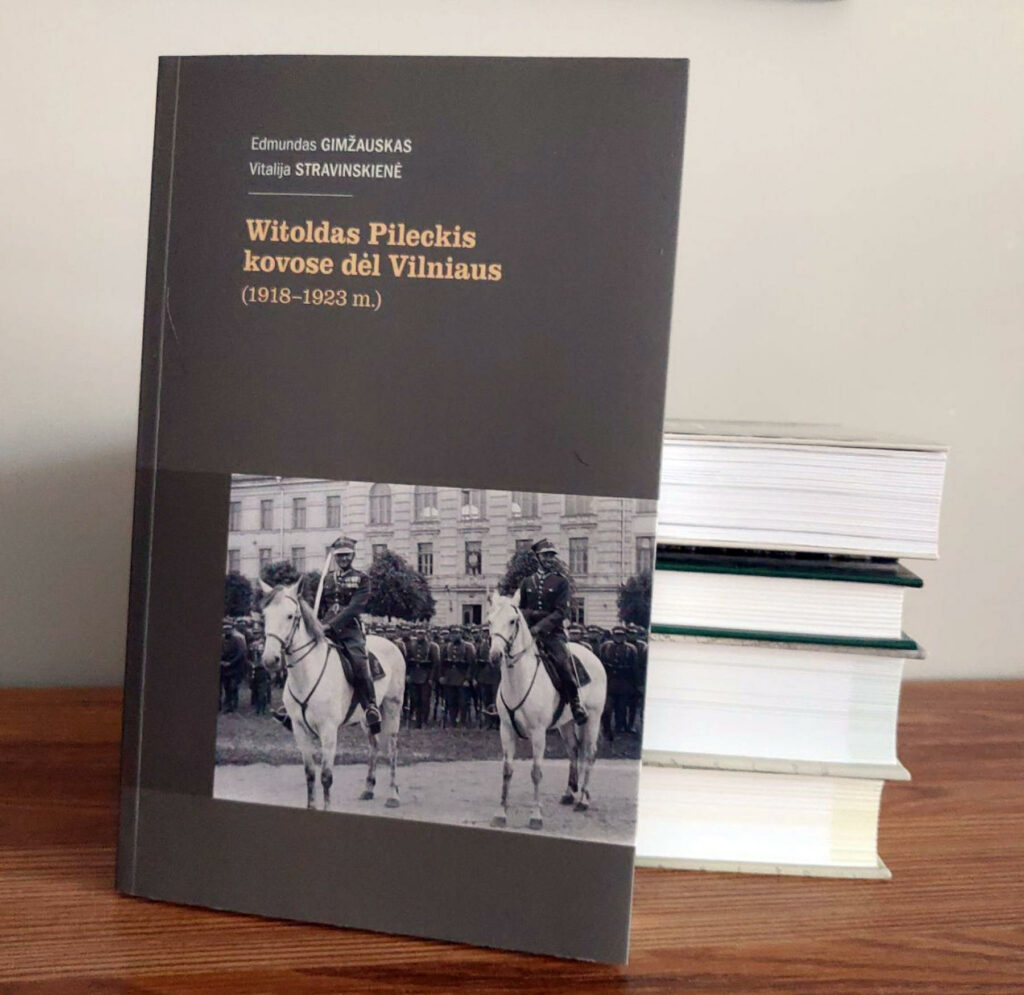- May 26, 2023
- 502
Vitalija Stravinskienė: “Pilecki was brought up to be a tough Pole”

Conversation with Dr. Vitalija Stravinskienė from the Institute of History of Lithuania, co-author of the book “Witold Pilecki in the fight for Vilnius (1918-1923)” (lit. “Witoldas Pileckis kovose dėl Vilniaus (1918-1923 m.)”).
Ilona Lewandowska: In 2022, together with Dr. Edmundas Gimžauskas, you published the first book in Lithuania devoted to rtm. Witold Pilecki. What made you choose this topic?
Vitalija Stravinskienė: Witold Pilecki is a very relevant figure nowadays. Due to the social and political circumstances, first in Poland and then in other European countries, this Polish hero is attracting more and more interest, the historical memory of him is actively cultivated. It was this interest that made it necessary to deal with his figure in the Lithuanian context. He is also a figure associated with Lithuania, the years of his early youth are directly related to Vilnius, so this period was the most interesting from our perspective, and it is this part of Witold Pilecki’s biography that our monograph devotes the most attention to. Based on the sources and the latest historiographical material in the book “Witold Pilecki in the fight for Vilnius (1918-1923)”, we attempt to reconstruct the military and social activities of Pilecki’s hero. We discuss his participation in the annexation of Vilnius and the Vilnius region to Poland and his attitude towards Lithuania and the Lithuanians.
There is not much information about this period, which is also evident in the book. It focuses rather on the environment in which Pilecki found himself, and not on his character…
Yes, indeed, there are not many of these sources, which is why this period of Pilecki’s activity is one of the least described by Polish historians. Only Krzysztof Tracki drew attention to him in the book “Youth of Witold Pilecki”. Usually, the attention of researchers is focused on his activities in adulthood. Indeed, we are talking about a time when there are fewer traces of human activity, because man has not yet had such great opportunities to shape the reality around him. At the same time, however, it was a time when this adult Pilecki was shaping up and making life choices, so it is worth highlighting it.
What is left of Pilecki in the archives?
In Lithuania, you can read materials about his education and activities in the National Security Association. It’s not much. Most of the materials are certainly in Warsaw.
You mentioned that this period in Vilnius shaped Pilecki. What or who had the greatest influence on him at that time?
It was the time of the fight for independence, in which Pilecki was very actively involved on the Polish side. In the fall of 1918, he returned to Vilnius to continue his education at the junior high school of Joachim Lelewel. Soon, however, he joined the self-defense units, which included a group of senior scouts. In 1919, he joined the unit commanded by brothers Władysław and Jerzy Dąbrowski. In this uhlans unit commanded by the famous Jerzy Dąbrowski “Łupaszka”, Witold fought until the autumn of 1919. One can say that he was fascinated by the commander and this had a huge impact on the development of such character traits as readiness for action, endurance and readiness to endure adversity. At the same time, however, it must be admitted that it was not flawless company. The uhlan regiment commanded by the Dąbrowski brothers was known not only for its combat effectiveness, but also for its difficult relations with the civilian population in the territories of present-day Lithuania and Belarus. It was definitely not a crystal environment. We have no further information about Pilecki during this period. He was a young man who was just growing up, not yet an officer, not much depended on him. However, he made choices and apparently the Dąbrowskis’ activities suited him, although they aroused resistance among older, more experienced soldiers. After the unit was demobilized, Witold returned to study at the Vilnius gymnasium, but after the start of the Polish-Bolshevik war in July 1920, he returned to the army, to the same unit. In August 1920, under the command of Capt. Jerzy Dąbrowski fought in the suburbs of Warsaw, later he was sent to the troops of General Lucjan Żeligowski. Together with these troops he fought with the Lithuanians for Vilnius.

Is it possible today in Lithuania to study a character who took part in the battles for Vilnius without ideological prejudice?
It is not difficult for a historian. The problem, however, is that people find it hard to believe that we operate professionally. For us, as historians, it is important to recreate the realities of those times, which were very interesting, dynamic and changeable. Based on what we know, we search for historical truth, distancing ourselves from political or social influences. After the publication of this book, I was met with questions as to whether it was a political order. Absolutely not. We simply responded to a social need, because he is undoubtedly an interesting character.
How can Lithuanians look at Pilecki?
Certainly one cannot expect that it will look like the Polish one. From the Lithuanian perspective, the Vilnius stage of Pilecki’s life is primarily a conflict over Vilnius and the Vilnius region. He was, like his commanders, a consistent supporter of the idea of ”Central Lithuania”, found himself on the opposite side in relation to the Lithuanians and persistently defended Polish interests. Lithuanian national aspirations did not matter to him, he did not understand them and did not deal with them. He was simply brought up to be a tough Pole who persistently strives for his goal. For him, Vilnius was part of Poland and in the context of his family ties, this can be understood. All this, of course, does not diminish his merits in the fight against totalitarianism, heroism during World War II and the post-war period. From the Lithuanian perspective, however, the conflict over Vilnius cannot be overlooked.
Were there any known connections with Lithuanians in this youthful period?
There is one thread, I think very interesting, of Pilecki’s first love. Correspondence from before Pilecki’s marriage with Anna née Święciany, a young girl from a Polish-Lithuanian family, has been preserved. Witold Pilecki was clearly in love with her, because he wrote letters to her for about 5-6 years. This period in Vilnius ended in September 1926, when he became the owner of an estate in Sukurcze, began to modernize and develop it. Then his life was dominated by family and work, he rarely returned to Vilnius.
Is there a chance that, despite the connection with Żeligowski, there will one day be Witold Pileckiego Street in Vilnius?
It’s not a question for me. As a historian, it is my job to highlight the facts, and the city authorities are responsible for making such decisions.
Translated by Aleksandra Bukhovets within the framework of a traineeship programme of the European Foundation of Human Rights, www.efhr.eu.

